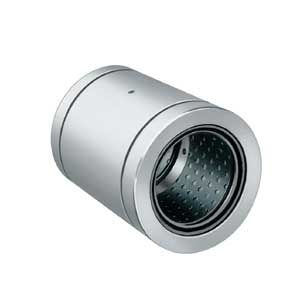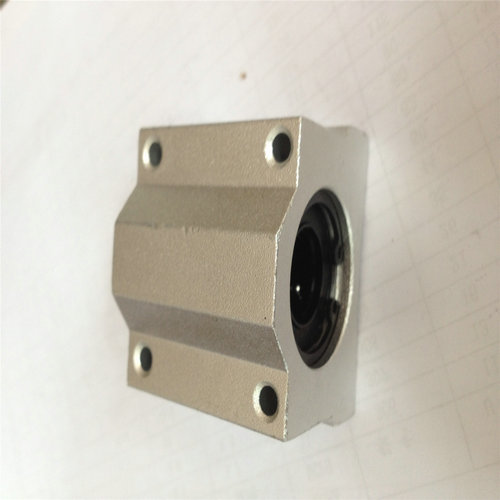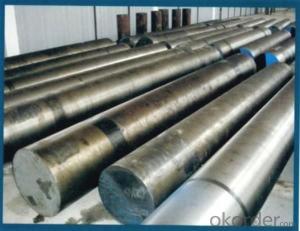Bearing Steels High Quality Special Steel
- Loading Port:
- China Main Port
- Payment Terms:
- TT or LC
- Min Order Qty:
- -
- Supply Capability:
- -
OKorder Service Pledge
OKorder Financial Service
You Might Also Like
Product Description:
OKorder is offering Bearing Steelsat great prices with worldwide shipping. Our supplier is a world-class manufacturer of steel, with our products utilized the world over. OKorder annually supplies products to European, North American and Asian markets. We provide quotations within 24 hours of receiving an inquiry and guarantee competitive prices.
Product Applications:
Wire drawing die/ Heading die
High Quality Bearing steel is used for manufacturing ball, roller bearing steel and rings. Bearing in work is under great pressure and friction, so have high demands bearing steel and hardness and resistance, and high elastic limit.
Bearing steels are used for ball and roller bearing applications and are comprised of low carbon steels and high carbon through harden able steel.
For example, bearing ring, steel rolling mill, machinery, 100Cr6 bearing steel ball is widely used in high-speed and low-noise bearing, bicycle, motorcycle, automobile, bags electronically.
.
Product Advantages:
OKorder's Bearing Steels are durable, strong, and resist corrosion.
Main Product Features:
· Premium quality
· Prompt delivery & seaworthy packing (30 days after receiving deposit)
· Corrosion resistance
· Can be recycled and reused
· Mill test certification
· Professional Service
· Competitive pricing
Product Specifications:
Grade | AISI 52100, ASTM E52100, DIN 1.3505,JIS SUJ2, GCr15 |
Dimensions | Diameter: 30-60mm Length: 2000-13000mm or as required |
Shape | Round Bar |
Type | Alloy Steel Bar |
Delivery Condition | Black Surface |
Material | Bearing Steel |
Technique | Hot Rolled |
Note of Bearing Steel Round Bar
1. According to national standard (GB) for our products, if not, supply according to national standards (GB) or agreement.
2. We can not only provide electric furnace +LF+VD and electros lag re-melting (ESR) steel forging materials, but also forging products of piece, bar, etc.
3. Our company is equipped with roll equipment and can provide our customers with roll billets or finished.
4. Please send us your detailed specifications when inquire. We will reply to you ASAP.
5. Certificate of quality is issued in English, in addition the normal terms, production process, the mechanical property (yield strength, tensile strength, elongation and hardness. forged ratio, UT test result, Grain size, heat treatment methods and the sample of is shown on the certificate
FAQ:
Q1: Why buy Materials & Equipment from OKorder.com?
A1: All products offered byOKorder.com are carefully selected from China's most reliable manufacturing enterprises. Through its ISO certifications, OKorder.com adheres to the highest standards and a commitment to supply chain safety and customer satisfaction.
Q2: How do we guarantee the quality of our products?
A2: We have established an advanced quality management system which conducts strict quality tests at every step, from raw materials to the final product. At the same time, we provide extensive follow-up service assurances as required.
Q3: How soon can we receive the product after purchase?
A3: Within three days of placing an order, we will begin production. The specific shipping date is dependent upon international and government factors, but is typically 7 to 10 workdays.
Images:


- Q:How is special steel used in the marine manufacturing process?
- Special steel is used in the marine manufacturing process for various applications such as constructing the ship's hull, propellers, and other critical components. Its high strength, corrosion resistance, and durability make it ideal for withstanding the harsh marine environment and ensuring the safety and reliability of the vessel.
- Q:What are the common challenges in machining titanium alloys?
- The common challenges in machining titanium alloys include their high chemical reactivity, low thermal conductivity, high cutting forces, and poor chip control. Additionally, titanium alloys tend to work harden, making them prone to tool wear and requiring frequent tool changes. Moreover, their low modulus of elasticity can lead to vibration and chatter during machining operations, affecting surface quality and dimensional accuracy.
- Q:What are the different surface hardening techniques used for special steel?
- Some of the different surface hardening techniques used for special steel include case hardening, nitriding, carburizing, and induction hardening.
- Q:How does special steel contribute to improved product performance?
- Special steel contributes to improved product performance in several ways. Firstly, special steel is known for its exceptional strength and durability. This allows products made from special steel to withstand heavy loads, high temperatures, and harsh environments without deforming or breaking. This enhanced strength and durability result in a longer product lifespan and reduced maintenance requirements. Additionally, special steel possesses excellent corrosion resistance properties. It is less susceptible to rust and other forms of corrosion, making it ideal for products that are exposed to moisture or chemicals. This corrosion resistance ensures that the product remains in optimal condition, even in corrosive environments, and reduces the need for frequent replacements. Special steel also offers superior heat resistance. It can withstand extreme temperatures without losing its mechanical properties, such as strength and hardness. This makes it suitable for products that operate in high-temperature conditions, such as engines, turbines, and exhaust systems. The ability of special steel to retain its properties at elevated temperatures significantly improves product performance and reliability. Furthermore, special steel can be tailored to meet specific requirements through different alloying elements and heat treatment processes. This customization allows manufacturers to fine-tune the material properties to suit the intended application, leading to improved product performance. For example, by adjusting the alloying elements, special steel can exhibit improved wear resistance, impact resistance, or hardness, depending on the desired application. In summary, special steel contributes to improved product performance by providing exceptional strength, durability, corrosion resistance, heat resistance, and customization options. These properties enhance the product's lifespan, reliability, and performance under challenging conditions, ultimately benefiting the end-users.
- Q:What are the applications of special steel in the oil and gas industry?
- Special steel is widely used in the oil and gas industry for various applications. It is commonly utilized in the construction of pipelines, as it possesses high strength and corrosion resistance, which ensures the safe and efficient transportation of oil and gas. Special steel is also employed in the manufacturing of drilling equipment, such as drill bits, casing, and tubing, as it can withstand extreme conditions, including high pressure and temperature. Furthermore, special steel is utilized in the fabrication of storage tanks and offshore platforms, providing durability and resistance to harsh environmental factors. Overall, the applications of special steel in the oil and gas industry contribute to the reliability and longevity of the infrastructure and equipment involved in the extraction, processing, and transportation of oil and gas.
- Q:What is the cost difference between regular steel and special steel?
- The cost difference between regular steel and special steel can vary significantly depending on various factors such as the specific type of special steel, its grade, production techniques, and market demand. In general, special steel tends to be more expensive than regular steel due to its enhanced properties, specific alloy compositions, and specialized production processes. However, it is important to note that the cost difference may fluctuate and it is best to consult with suppliers or conduct market research for accurate and up-to-date pricing information.
- Q:What is the role of heat treatment in special steel?
- Enhancing the properties and performance of special steel is of utmost importance, and heat treatment plays a vital role in achieving this. Special steel refers to alloys that are deliberately designed to possess unique characteristics such as high strength, corrosion resistance, or heat resistance. To alter the microstructure of the steel and attain the desired properties, heat treatment involves subjecting it to controlled heating and cooling processes. Improving the mechanical properties of special steel is one of the primary functions of heat treatment. By carefully regulating the temperature during heating and controlling the rate of cooling, the steel's hardness, strength, and toughness can be greatly enhanced. For instance, procedures like quenching and tempering significantly increase the steel's strength and resistance to wear and fatigue. This makes it suitable for applications requiring high strength and durability, such as machinery, tools, or aerospace components. Heat treatment also plays a crucial role in optimizing the steel's resistance to corrosion. Special steel is frequently used in environments where it is exposed to harsh conditions like corrosive chemicals or high temperatures. By subjecting the steel to specific heat treatment processes like annealing or precipitation hardening, a more stable microstructure is developed, improving its resistance to corrosion and oxidation. This ensures that the special steel retains its structural integrity and performance even in challenging environments. Furthermore, heat treatment can modify the steel's heat resistance properties. Special steel often finds applications in industries where it is exposed to high temperatures, such as turbines or exhaust systems. Through heat treatment techniques like normalization or hardening, the steel can be made more resistant to deformation, cracking, or softening at elevated temperatures. This allows the special steel to maintain its strength and structural integrity even under extreme heat conditions. To summarize, heat treatment is crucial in optimizing the mechanical, corrosion resistance, and heat resistance properties of special steel. By carefully manipulating the steel's microstructure through controlled heating and cooling processes, heat treatment enhances its strength, durability, and performance, making it suitable for a wide range of demanding applications.
- Q:How does special steel contribute to the weldability of products?
- The weldability of products is improved in various ways by special steel. Firstly, special steel is designed specifically to have enhanced weldability characteristics, making it easier for welders to join different pieces of steel. This is achieved by carefully controlling the chemical composition of the steel, ensuring that it contains the necessary alloying elements and impurity levels to promote good weldability. Secondly, special steel often has a lower carbon content compared to regular steel, reducing the likelihood of weld metal cracking. Carbon is known to increase the susceptibility to cracking during welding, so by decreasing the carbon content, special steel reduces this risk, resulting in a stronger and more durable weld joint. Furthermore, the weldability of special steel is improved by controlling the grain size and microstructure. Fine-grained steel exhibits better toughness and reduced brittleness, making it less prone to cracking during welding. Similarly, a well-controlled microstructure ensures a more uniform distribution of alloying elements, leading to improved mechanical properties and weldability. To further enhance its weldability, special steel often undergoes various heat treatment processes. Annealing, normalizing, or quenching and tempering can refine the microstructure, relieve residual stresses, and improve the toughness of the steel, all of which contribute to better weldability. In addition, special steel is carefully manufactured to have low levels of impurities, such as sulfur and phosphorus, which can negatively affect weldability. By minimizing these impurities, the steel can be welded without the formation of detrimental welding defects, ultimately improving the overall quality of the weld. In conclusion, special steel plays a crucial role in enhancing the weldability of products. Its carefully controlled chemical composition, reduced carbon content, controlled grain size and microstructure, as well as the application of heat treatments, all contribute to easier, stronger, and more reliable weld joints.
- Q:Can special steel be used for structural applications?
- Yes, special steel can be used for structural applications. Special steel refers to a wide range of steel alloys that are specifically designed to possess enhanced mechanical properties, such as increased strength, durability, and corrosion resistance. These qualities make special steel suitable for various structural applications, including buildings, bridges, pipelines, and heavy machinery.
- Q:How are copper alloys used in electrical applications?
- Copper alloys are extensively used in electrical applications due to their excellent electrical conductivity and thermal properties. They are used in the production of electrical wires, connectors, and busbars, ensuring efficient transmission of electricity. Copper alloys also offer good corrosion resistance, making them suitable for outdoor and marine electrical systems. Additionally, their high strength and ductility allow for easy fabrication and installation in various electrical components.
1. Manufacturer Overview |
|
|---|---|
| Location | |
| Year Established | |
| Annual Output Value | |
| Main Markets | |
| Company Certifications | |
2. Manufacturer Certificates |
|
|---|---|
| a) Certification Name | |
| Range | |
| Reference | |
| Validity Period | |
3. Manufacturer Capability |
|
|---|---|
| a)Trade Capacity | |
| Nearest Port | |
| Export Percentage | |
| No.of Employees in Trade Department | |
| Language Spoken: | |
| b)Factory Information | |
| Factory Size: | |
| No. of Production Lines | |
| Contract Manufacturing | |
| Product Price Range | |
Send your message to us
Bearing Steels High Quality Special Steel
- Loading Port:
- China Main Port
- Payment Terms:
- TT or LC
- Min Order Qty:
- -
- Supply Capability:
- -
OKorder Service Pledge
OKorder Financial Service
Similar products
New products
Hot products
Related keywords





























